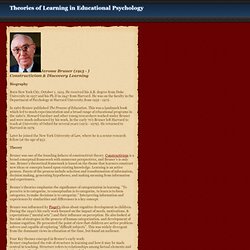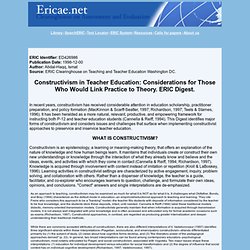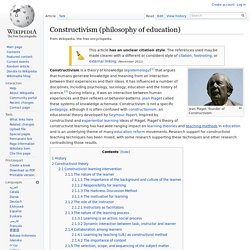

Jerome Bruner: Constructivism & Discovery Learning. Jerome Bruner (1915 - ) Constructivism & Discovery Learning Biography Born New York City, October 1, 1915.

Introduction to Learning Theories. ED426986 1998-12-00 Constructivism in Teacher Education: Considerations for Those Who Would Link Practice to Theory. ERIC Digest. ERIC Identifier: ED426986 Publication Date: 1998-12-00 Author: Abdal-Haqq, Ismat Source: ERIC Clearinghouse on Teaching and Teacher Education Washington DC.

In recent years, constructivism has received considerable attention in education scholarship, practitioner preparation, and policy formation (MacKinnon & Scarff-Seatter, 1997; Richardson, 1997; Teets & Starnes, 1996). It has been heralded as a more natural, relevant, productive, and empowering framework for instructing both P-12 and teacher education students (Cannella & Reiff, 1994). This Digest identifies major forms of constructivism and considers issues and challenges that surface when implementing constructivist approaches to preservice and inservice teacher education. Constructivism is an epistemology, a learning or meaning-making theory, that offers an explanation of the nature of knowledge and how human beings learn.
As an approach to teaching, constructivism may be examined as much for what it is NOT as for what it is. Constructivism (learning theory) Jean Piaget: founder of Constructivism In past centuries, constructivist ideas were not widely valued due to the perception that children's play was seen as aimless and of little importance.

Jean Piaget did not agree with these traditional views, however. He saw play as an important and necessary part of the student's cognitive development and provided scientific evidence for his views. Today, constructivist theories are influential throughout much of the non-formal learning sector. One good example of constructivist learning in a non-formal setting is the Investigate Centre at The Natural History Museum, London.